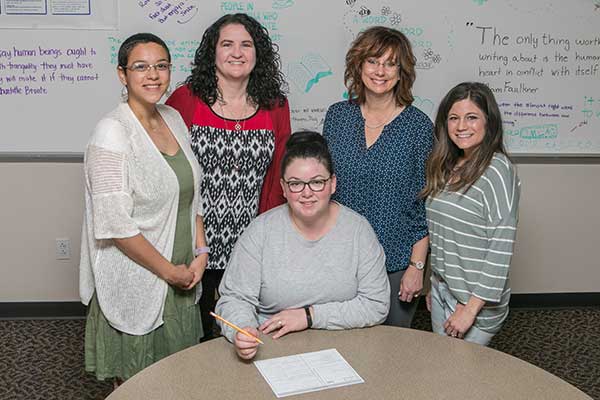By Kris McBride
THATCHER, Ariz. – Eastern Arizona College (EAC) has received a federal “Strengthening Institutions Program Grant” that is projected to boost graduation rates by reforming developmental education and advising with new technologies and fresh ideas that help students graduate more quickly. The U.S. Department of Education Title III grant totals $2,920,591, and will account for up to 83 percent of the total overhaul cost. Non-governmental sources will account for up to 17 percent of the total cost.
Almost two-thirds of students who enter community colleges every year are found academically unprepared to engage in college-level work. In order to enroll, these students must typically take one or more “remedial” courses that do not count toward their college degree. Research shows that this traditional approach to developmental education has little positive impact on student success. Instead, the remedial process causes students to fall behind peers without gaining academic benefits, lose financial aid and other funding sources, or simply not show up for classes, ultimately forgoing higher education.
“One of the most important things we can do to increase the number of students who graduate with a degree or certificate is strengthen our remediation program,” stated Todd Haynie, EAC president. “In short, we must be more innovative about helping our underprepared students spend less time and money catching up academically and this grant allows us to do just that.”
The grant will fund the EAC “Inspire” program which includes three key elements that will lead to improved retention and completion:
Overhaul developmental education by blending credit-bearing classes with enhanced academic supports. This includes using multiple placement assessments to accurately assign students to credit-bearing pathways, offering modularized courses, and, mainstreaming students into credit-bearing classes.
Move the counseling department away from the traditional, passive model of waiting for students to initiate appointments to a “seek-them-out” process. This system will be reinforced with proactive advising, online and face-to-face tutoring, career exploration services, communicating program expectations to students, and a mandatory freshman experience course. In addition, advisors will use texting – students’ preferred method of communication – to deliver practical information that helps students perform to their full potential.
Improve access for rural students by expanding online learning opportunities. This will be accomplished by redesigning and modularizing existing courses, and creating new courses.
The framework for the Inspire program is patterned after the City University of New York’s Accelerated Study in Associate Program which has experienced considerable success helping community college students with remedial education needed to complete their studies and earn associate degrees. Included within the Inspire program is a quasi-experimental design that allows researchers to determine which components work best for specific populations. “We are particularly interested in making this work for our Native American students,” stated Eldon Woodall, EAC director of grants. “These students face many unique challenges, and we want to provide the best support to help them achieve their educational goals.”
All EAC students are eligible to receive free support services from the Inspire program. To learn more, students should contact Inspire’s career navigators, Kristi Apodaca at (928) 428-8316 or Candace Lines at (928) 428-8335.
“Student support has always been at the heart of everything EAC does,” stated Max Phillips, Title III SIP grant director. “This generous grant and the Inspire program will allow us to provide more proactive support by identifying potential risks in a student’s educational path and creating a safety net that minimizes negative impacts.”

Left to right: Almalia Berrios-Payton (Inspire tutor), Kristi Apodaca (Inspire career navigator), Candace Lines (Inspire career navigator), Tasha Layton (English and Writing Center associate professor), and Becca Webb (seated, Inspire tutor). [Photo: Kris McBride, Eastern Arizona College]









